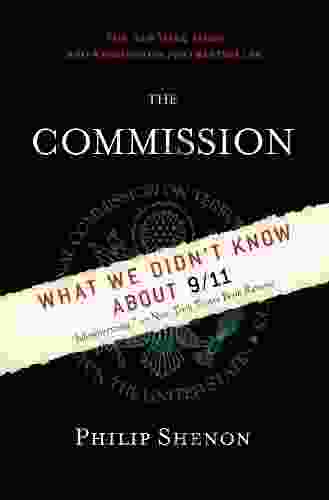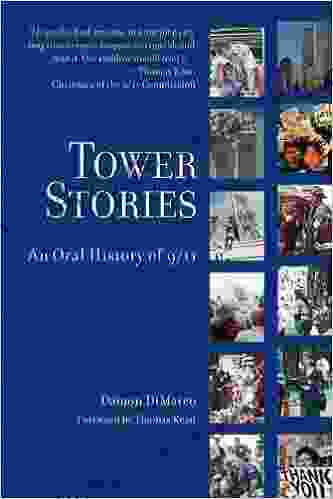The Commission: The Uncensored History of the 9/11 Investigation

In the aftermath of the catastrophic terrorist attacks of September 11, 2001, the United States embarked on a mission to uncover the truth behind the deadliest assault on its soil. The 9/11 Commission, an independent bipartisan body, was established to conduct a comprehensive investigation into the events leading up to the attacks and make recommendations to prevent future tragedies.
The Commission's mandate was broad and ambitious. It was tasked with examining the intelligence failures, security lapses, and decision-making processes that contributed to the success of the terrorist plot. The investigation involved interviewing hundreds of witnesses, reviewing countless documents, and analyzing complex intelligence data. The Commission's work was marked by both intense scrutiny and high expectations.
4.2 out of 5
| Language | : | English |
| File size | : | 1304 KB |
| Text-to-Speech | : | Enabled |
| Screen Reader | : | Supported |
| Enhanced typesetting | : | Enabled |
| Word Wise | : | Enabled |
| Print length | : | 465 pages |
Formation and Composition
The 9/11 Commission was created by an executive order issued by President George W. Bush on November 27, 2002. The Commission consisted of ten members: five Democrats and five Republicans. The co-chairs were former New Jersey Governor Thomas Kean (R) and former Representative Lee Hamilton (D). Other members included former Secretary of State Madeleine Albright, former National Security Advisor Brent Scowcroft, and former FBI Director Louis Freeh.
The Commission's bipartisan composition was intended to ensure objectivity and credibility. However, the selection process was not without controversy. Critics argued that some of the members had potential conflicts of interest or were too closely aligned with the Bush administration.
Investigative Process
The Commission's investigation was thorough and far-reaching. It held 12 public hearings, heard testimony from over 1,200 witnesses, and reviewed millions of pages of documents. The Commission's staff conducted extensive research and analysis, including interviews with intelligence officials, law enforcement personnel, and victims' families.
The Commission's investigation focused on several key areas, including:
- Intelligence failures: The Commission examined the shortcomings of the intelligence community in detecting and preventing the 9/11 attacks.
- Security lapses: The Commission investigated the security vulnerabilities that allowed the terrorists to carry out their plot.
- Decision-making: The Commission analyzed the decision-making processes of the Bush administration and other government officials in the lead-up to the attacks.
Findings and Recommendations
The 9/11 Commission released its final report on July 22, 2004. The report was a comprehensive and damning indictment of the intelligence failures and security lapses that had contributed to the attacks. The Commission made a series of recommendations to prevent future terrorist attacks, including:
- Creating a new National Counterterrorism Center to coordinate intelligence and law enforcement efforts.
- Strengthening border security and aviation security measures.
- Improving the sharing of intelligence information between different agencies.
- Establishing a new Department of Homeland Security to oversee domestic security efforts.
Controversy and Criticism
The 9/11 Commission's findings and recommendations were met with mixed reactions. Some praised the Commission's thorough investigation and its willingness to expose government failures. Others criticized the report for being too lenient on the Bush administration and for failing to address the role of Saudi Arabia in the attacks.
One of the most controversial aspects of the Commission's report was its that the Bush administration had not received any "specific and credible" intelligence warnings about the impending attacks. This finding was disputed by some critics, who argued that the administration had ignored or downplayed intelligence reports that could have prevented the attacks.
Legacy
The 9/11 Commission's legacy is complex and multifaceted. The Commission's report played a significant role in shaping post-9/11 security policy, including the creation of the Department of Homeland Security and the implementation of new intelligence-sharing mechanisms.
However, the Commission's findings and recommendations have also been the subject of ongoing debate and controversy. Critics argue that the Commission's investigation was incomplete and that it failed to hold the Bush administration fully accountable for its failures. Others argue that the Commission's recommendations have been effective in preventing future terrorist attacks.
The 9/11 Commission's report remains a valuable historical document that provides a comprehensive account of the intelligence failures and security lapses that led to the 9/11 attacks. However, the Commission's legacy is likely to continue to be contested for years to come.
4.2 out of 5
| Language | : | English |
| File size | : | 1304 KB |
| Text-to-Speech | : | Enabled |
| Screen Reader | : | Supported |
| Enhanced typesetting | : | Enabled |
| Word Wise | : | Enabled |
| Print length | : | 465 pages |
Do you want to contribute by writing guest posts on this blog?
Please contact us and send us a resume of previous articles that you have written.
 Book
Book Novel
Novel Text
Text Genre
Genre Reader
Reader Library
Library E-book
E-book Newspaper
Newspaper Sentence
Sentence Shelf
Shelf Glossary
Glossary Preface
Preface Synopsis
Synopsis Footnote
Footnote Manuscript
Manuscript Scroll
Scroll Bestseller
Bestseller Classics
Classics Narrative
Narrative Autobiography
Autobiography Encyclopedia
Encyclopedia Dictionary
Dictionary Narrator
Narrator Resolution
Resolution Librarian
Librarian Card Catalog
Card Catalog Borrowing
Borrowing Stacks
Stacks Archives
Archives Lending
Lending Journals
Journals Reading Room
Reading Room Rare Books
Rare Books Special Collections
Special Collections Literacy
Literacy Study Group
Study Group Reading List
Reading List Book Club
Book Club Theory
Theory Textbooks
Textbooks Adell Ryan
Adell Ryan Michael Koryta
Michael Koryta Kevin L Schewe Md
Kevin L Schewe Md Jacob Weisberg
Jacob Weisberg Gigi Priebe
Gigi Priebe Kristi Simpson
Kristi Simpson Jerrold Mundis
Jerrold Mundis Natalie Shaw
Natalie Shaw Lauran Paine Jr
Lauran Paine Jr Thomas Doherty
Thomas Doherty Karl Marlantes
Karl Marlantes David Herbert Donald
David Herbert Donald Indiana Ellington
Indiana Ellington Esther Gili
Esther Gili Gerrard Wilson
Gerrard Wilson Lindsay Porter
Lindsay Porter Zach Abraham
Zach Abraham Patrick W Dyer
Patrick W Dyer Tammy L Grace
Tammy L Grace Maurice Broaddus
Maurice Broaddus
Light bulbAdvertise smarter! Our strategic ad space ensures maximum exposure. Reserve your spot today!

 Samuel WardStance Auto Magazine Ford Edition: A Comprehensive Guide to the World of Ford...
Samuel WardStance Auto Magazine Ford Edition: A Comprehensive Guide to the World of Ford... Jeffrey CoxFollow ·16.4k
Jeffrey CoxFollow ·16.4k Felix CarterFollow ·2.3k
Felix CarterFollow ·2.3k Eddie PowellFollow ·9.9k
Eddie PowellFollow ·9.9k Benjamin StoneFollow ·7.8k
Benjamin StoneFollow ·7.8k Harry CookFollow ·18.3k
Harry CookFollow ·18.3k Mario BenedettiFollow ·14.3k
Mario BenedettiFollow ·14.3k Colby CoxFollow ·16.2k
Colby CoxFollow ·16.2k John MiltonFollow ·14k
John MiltonFollow ·14k
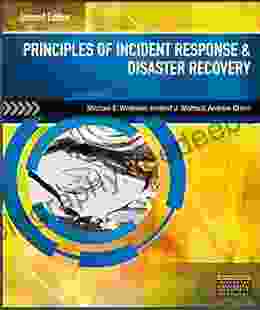
 Franklin Bell
Franklin BellSecond Edition Pdf No Audio: A Comprehensive Guide to the...
The Second Edition...
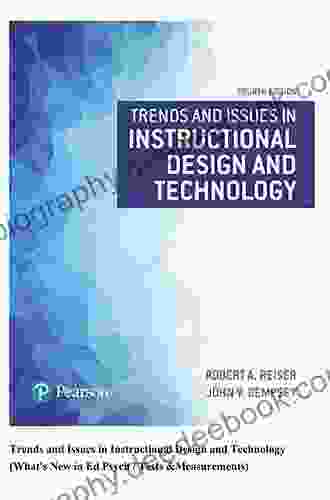
 Jackson Blair
Jackson BlairTrends and Issues in Instructional Design and Technology
Instructional...
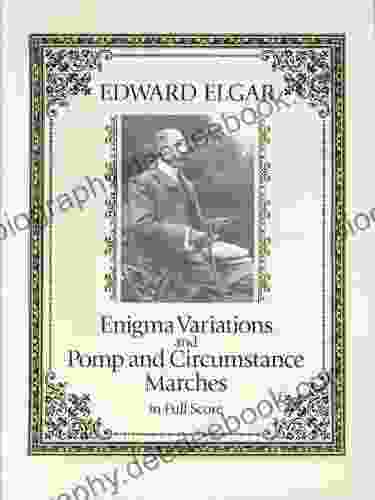
 Mario Vargas Llosa
Mario Vargas LlosaEnchanting Enigma Variations and Triumphant Pomp and...
The Enigma Variations: A...

 Dwight Blair
Dwight BlairTime Between Us: A Novel That Explores the Power of...
Prepare to be swept away by...
4.2 out of 5
| Language | : | English |
| File size | : | 1304 KB |
| Text-to-Speech | : | Enabled |
| Screen Reader | : | Supported |
| Enhanced typesetting | : | Enabled |
| Word Wise | : | Enabled |
| Print length | : | 465 pages |


